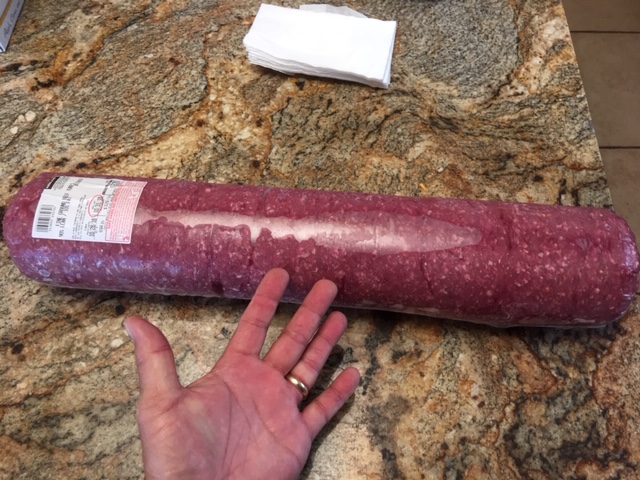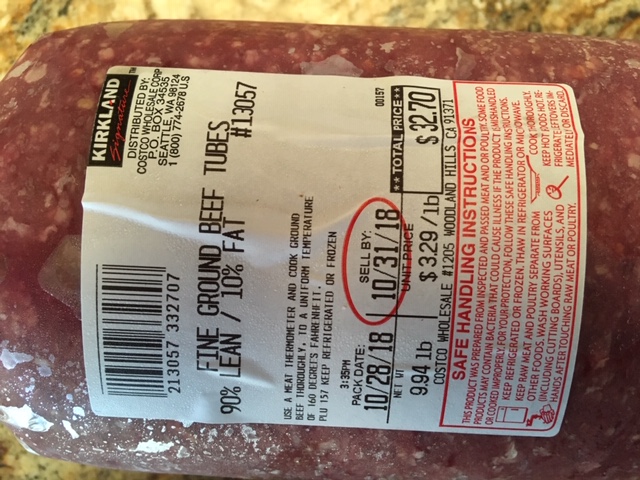Topic
Hamburger Trick
Forum Posting
A Membership is required to post in the forums. Login or become a member to post in the member forums!
Home › Forums › General Forums › Food, Hydration, and Nutrition › Hamburger Trick
- This topic has 20 replies, 13 voices, and was last updated 5 years, 10 months ago by
 Steve Collins.
Steve Collins.
-
AuthorPosts
-
Oct 29, 2018 at 12:35 am #3561642
We read about a hack to get a good deal on hamburger so I thought that I would pass this on. I cook and dry hamburger for many backpacking meals. Usually I use 90/10 or 92/8 if I can find it. 1 pound cooked will dry to about 4 oz. In Los Angeles 90/10 run about $8/pound.
The hack is to go to the Costco Meat department and ask for a tube of hamburger. The stock 10 pound tubes that is used to mix down to different blend: 80/20. The tube on it’s own is 90/10 and cost $3.29/pound so you get lean hamburger at about half the price.

 Oct 30, 2018 at 6:05 am #3561784
Oct 30, 2018 at 6:05 am #3561784How do you cook it? I could imagine it losing more or less fat, depending on the method.
Then dry it in a dehydrator?
Within the limits of the final recipe, I’d be tempted to salt it well for the additional preservative effect (i.e. add all the recipe’s salt to the burger). My theory on smoked sockeye and caribou is that 1) dehydration, 2) sugar, 3) salt, 4) smoke, 5) cooking, and 6) freezing are all preservation techniques. The more you do, the longer (or in warmer temps) it will last. And the less you do of some techniques, the more you need to use the others.
Oct 30, 2018 at 12:02 pm #3561790Great hack, thank you. Passed that info onto my wife.
Oct 30, 2018 at 2:23 pm #3561800David,
I take 1 pound of lean hamburger and brown it in a fry pan. Break the hamburger up into small pieces. When cooked, I add boiling water to float some of the residual fat off and dump everything into a strainer. Dehydrate the meat and then I usually store it in the freezer. When rehydrating, I usually add a teaspoon of chicken boullion to bring back some of the flavor.
Nov 1, 2018 at 6:35 am #3562132The chicken bullion hack is golden! I just did this for two meals on my last trip (also used 90/10, dehydrated) and the flavor was fantastic.
Nov 11, 2018 at 6:13 am #3563524I’ve done the same with the Costco hamburger for thru-hiking the PCT and CDT and have found that running the meat thru the grinder, cooking in a frying pan as Jon mentioned, grind it again, then rinse in a colander with hot water works very well. By double grinding the meat, you’ll get a much finer grind which allows for faster, almost instant re-hydration and for non-cook meals, cold hydration in 10-15 minutes or less. The one problem with this method is that seasoning the meat prior to dehydrating is almost useless, so to solve that problem, add your seasoning to the bag when dividing it into individual meals.
Edit- I forgot to mention, add some powdered butter or other powdered dairy fat to your meal after dehydrating, by adding back some fats, it will taste better, give a calorie boost of about 200 cals. per oz and the seasoning will stick to whatever meat you ground up for the meal.
Nov 12, 2018 at 12:37 am #3563632Great “hamburger” hack Jon. I’m going to have to go backpacking a lot more to use up that much meat. I’ve often bought the 95-5 hamburger at Trader Joe’s but it is pricey.
A trick I learned was to add about 1/2 cup of breadcrumbs to the hamburger before cooking. It seems to help with the rehydration process. I still do it out of habit but since I changed to actually cooking my meals instead of just rehydrating them I don’t ever have the problem of having not quite fully rehydrated meals.
The added bullion is a great idea.
Jan 28, 2019 at 4:15 pm #3575501If chicken bullion powder is good, then beef bullion powder is better for hamburger. I also have found that using a small amount if chili powder works very well, from both the added preservative salt and for flavour.
Jan 29, 2019 at 4:47 am #3575623Whenever I’ve dehydrated cooked 96/4 hamburger from Trader Joe’s I’ve never bothered trying to do anything to remove the fat. I just throw it in the dehydrator after it’s cooked. That’s a great hack to know you can get the big tube from Costco. If I ever do a super long distance hike again I’ll definitely have to do that.
Feb 6, 2019 at 3:45 am #3577093Question:
What is the purpose of removing the fat? Will it last longer? Ideally I’d want to keep as much fat as possible.Second question:
What is this powdered butter? Fat is already very calorie dense, do you really save much weight per calorie?Feb 6, 2019 at 1:05 pm #3577135There is no real purpose to removing the fat. It is just considerably more difficult to dehydrate, ie it takes longer. For example, pemmican was used for hundreds of years in various forms. It was basically rendered fat(cooked) and dried/ground meat placed in a rather airtight container (bladder, intestine, hide, etc.) It would last for years. Air will cause fat to go rancid over time. Even this is not deadly, though, it just tastes pretty bad.
Powdered Butter is the same flavoring they use in margarine to give it the butter taste. You can buy it as “seasoning” to sprinkle on popcorn (mixed with salt/sugars.) I don’t think it has many calories because it has a very strong flavor. It can also be made from butter by removing all the liquids and fats, hence most of the sugars and calories.
Feb 6, 2019 at 2:44 pm #3577153Hack it up!
 Feb 6, 2019 at 8:06 pm #3577210
Feb 6, 2019 at 8:06 pm #3577210Have followed this procedure for may year with excellent results!
https://www.backpackingchef.com/
“Backpackers often call dehydrated ground beef “gravel” because it doesn’t rehydrate well. Solve this problem by adding bread crumbs to the meat before cooking it. Bread crumbs allow more liquid to penetrate the dried meat when you rehydrate it, so it turns out tender every time.
Use only lean or extra lean ground beef with fat content in the 7% to 15% range. Ground beef with 15% fat content is often labeled as Ground Round. Ground beef labeled as Chuck or Hamburger will have higher fat content. Grass fed beef is usually in the 7% to 10% range.
Some of the fat in the ground beef gets removed when you cook it. Some fat beads up on the surface of the meat while drying. Blot off the fat from the meat with paper towels after cooking and a couple of times while it dries. Starting with low fat meat and blotting off what you can during cooking and drying will minimize any risk of the meat spoiling after it is dried.
For each pound of beef, sprinkle ½ cup of finely ground bread crumbs over the meat. Work the bread crumbs into the raw meat with your fingers. Make bread crumbs by dehydrating bread slices for two to three hours and then grinding the dried bread in a food processor.
Break the meat into small pieces and cook in a frying pan over medium high heat until lightly browned and fully cooked, stirring continuously. Remove from heat and squeeze between paper towels to remove moisture.
Spread small pieces of ground beef on dehydrator trays covered with Excalibur Paraflexx® sheets, parchment paper or the fruit leather inserts that go with your dehydrator. Using non-stick sheets keeps small pieces of dried beef from falling through the trays.
Dry at 145° for approximately six hours. Ground beef will be hard when dry.
Once or twice during the drying process, move the meat around and squeeze with a paper towel to remove oil. Wipe any oil off the non-stick sheets. Break any pieces of meat that are drying slower than the rest in half.”
Mar 22, 2019 at 2:22 pm #3585034I’ve been using dried cooked burger for a long time. At some point during those couple decades I stumbled on a name for it … Burger Rocks.
Definitely make the additions after the wot water bath.
The powdered butter and bouillon idea is new to me … definitely gonna try it!
Mar 23, 2019 at 3:40 pm #3585157Great Costco tip!
I don’t fry my ground beef anymore. I drop pieces into a large pot of boiling water, cook briefly, strain, and rinse with more water until it doesn’t feel greasy in my hands. Before I dehydrate it, I give it a few pulses in the food processor to get all the pieces uniform – not too much. A 1/4 cup (dry) of Beef Gravel is my main protein on the trail (1/4 cup per serving). I do find that mixing bread crumbs into the raw ground beef before cooking results in product that rehydrates better and is more tender.
Mar 23, 2019 at 4:10 pm #3585165Maybe I don’t feel the need for bread in mine because frying it instead of boiling it leaves a bit more moisture inside?
I used to boil it and throw it in the food processor too for years, and that works great. I just found frying it and breaking it up into 3/4-1/2” chunks tasted better. I also dry it so it breaks apart but doesn’t feel like gravel.
To each their own, the boil and blend method is probably lighter and more compact – this is backpackinglight so it wins the race from that perspective :)
Steve
Mar 23, 2019 at 4:19 pm #3585167I might have been dehydrating it too hot and for too long frankly. I know there are variables at play here. I certainly would prefer an easier way. What temperature are you dehydrating your beef?
Mar 23, 2019 at 4:26 pm #3585170160 for 8-10 hours. I rotate the trays once or twice during the process.
Steve
Mar 23, 2019 at 7:25 pm #3585188Thanks, Steve
Mar 23, 2019 at 11:25 pm #3585215A long time ago I was advised that drying things at temperatures much higher than 140F is getting into cooking vs drying so I’ve always used 140F. I don’t recall the qualifications of that source so caveat emptor
Not exactly on topic but I see that for jerky, USDA recommends a minimum temp of 130F-140F
Mar 23, 2019 at 11:39 pm #3585216I’m not sure if it’s too hot or not but it works for me. I just turn it to the “meat/jerky” indicator on my dehydrator which is also listed at 160
-
AuthorPosts
- You must be logged in to reply to this topic.
Forum Posting
A Membership is required to post in the forums. Login or become a member to post in the member forums!
HAPPENING RIGHT NOW (February 11-21, 2025) - Shop Hyperlite Mountain Gear's Biggest Sale of the Year:
Our Community Posts are Moderated
Backpacking Light community posts are moderated and here to foster helpful and positive discussions about lightweight backpacking. Please be mindful of our values and boundaries and review our Community Guidelines prior to posting.
Get the Newsletter
Gear Research & Discovery Tools
- Browse our curated Gear Shop
- See the latest Gear Deals and Sales
- Our Recommendations
- Search for Gear on Sale with the Gear Finder
- Used Gear Swap
- Member Gear Reviews and BPL Gear Review Articles
- Browse by Gear Type or Brand.






